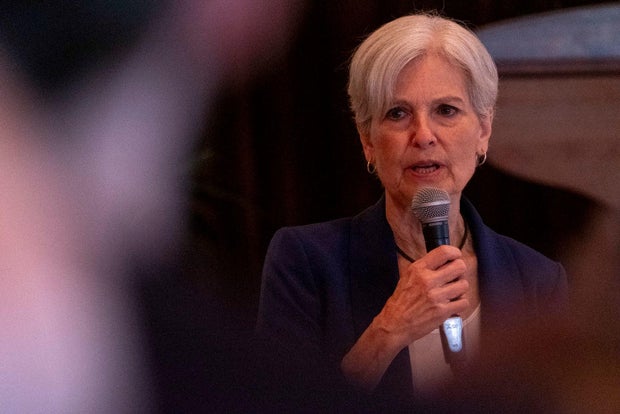Washington — The Supreme Court on Friday rejected a bid to put Green Party presidential candidate Jill Stein on the Nevada general election ballot, leaving in place a lower court decision that excluded the party from the vote.
The dispute is one of the first involving the upcoming election to land before the Supreme Court, though more are likely to follow. The high court in August revived part of an Arizona law requiring documentary proof of citizenship when registering to vote using a state-created form, but declined to allow enforcement of provisions mandating such proof in order to vote for president or by mail.
Both Nevada and Arizona are key battleground states that could decide the outcome of the presidential contest between Vice President Kamala Harris and former President Donald Trump. Stein is the Green Party’s nominee for president. Ballots in Nevada had to be finalized by Sept. 6.
The Supreme Court denied a request from the Nevada Green Party to toss out a lower court injunction that blocked its candidates from appearing on the general election ballot. There were no noted dissents.
The Nevada case
The dispute involving the Nevada Green Party was brought by the Nevada State Democratic Party, which sued in June to challenge the Green Party’s access to the ballot. Nevada Democrats claimed the Green Party, a minor political party in the state, used the wrong form to gather signatures to get on the ballot, rendering them invalid. The Green Party had been inadvertently emailed the incorrect form by the Nevada Secretary of State’s Office after its original petition contained a technical error.
Joel Angel Juarez for The Washington Post via Getty Images
The state Democratic Party was correct that the wrong affidavit was circulated, but the Green Party argued that keeping its candidates off the ballot would violate the Constitution. The Green Party prevailed before a state district court, but the Nevada Supreme Court found its rights were not violated.
The state high court then ordered the secretary of state to remove the Nevada Green Party candidates from the general election ballot.
“If the Green Party had reviewed the petition before using it, it would have discovered the incorrect circulator affidavit as the Green Party was clearly aware of the legal requirements for the affidavit considering it had used the correct affidavit in its original petition,” the Nevada Supreme Court said in its divided decision earlier this month. “This is an unfortunate oversight on the part of both the secretary and the Green Party.”
In a request for emergency relief from the Supreme Court, lawyers for the Nevada Green Party called the state court’s order preventing access to the ballot “extraordinary,” and a violation of due process and equal protection. They urged the Supreme Court to toss out the lower court ruling excluding the Green Party from the Nov. 5 ballot.
Green Party candidates “are wrongfully ripped from the ballot and Nevadans who would vote for them in this election are robbed of the opportunity to do so,” they argued. One of the lawyers involved in the case is Jay Sekulow, who has represented Trump in other matters in the past.
The Green Party claimed that thousands of Nevada voters who signed petitions for it to be listed on the ballot are now disenfranchised by the state supreme court’s decision.
“Exclusion from a ballot is tantamount to an electoral death penalty for candidates,” its lawyers claimed.
But Nevada Democrats argued that the relief the Green Party is seeking is “extraordinary” and “seemingly unprecedented,” and accused the party of attempting to be excused from failing to comply with the state’s ballot access laws.
Lawyers for the Democrats noted that ballots are already being printed and are set to be sent out within days, and disturbing the Nevada Supreme Court’s ruling would disrupt the printing process, they said. Ballots for military and overseas voters must be mailed out by Sept. 20, while out-of-state absentee ballots have to be sent out by Sept. 26. Nevada officials said in a separate filing that at least one county clerk has already sent out military and overseas ballots, as well as ballots to out-of-state voters, to ensure compliance with federal and state laws.
The state Democratic Party urged the justices to reject the Green Party’s “effort to inject chaos and uncertainty into Nevada’s election process during the ballot-printing process just days before ballots are sent to voters.”
Nevada’s secretary of state echoed warnings that ordering Stein to be placed back on the ballot would undermine the integrity of the state’s election, as the Green Party could try to force the state to send some voters new ballots.
“Here, the harm is far greater than just the loss of time preparing and printing ballots,” lawyers for the state told the Supreme Court in a filing. “Ballots have already been mailed to some voters, and if the Court grants the Application, it would lead to voter confusion and an erosion of confidence in the electoral process.”
